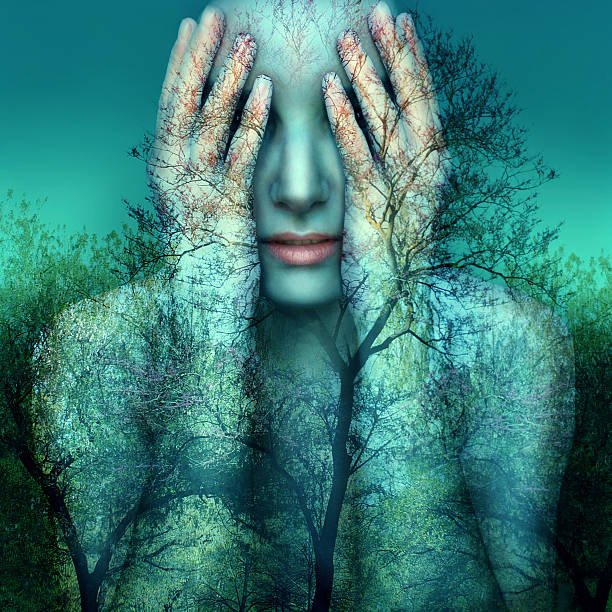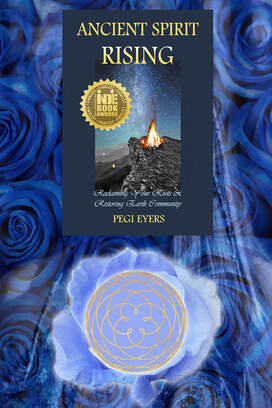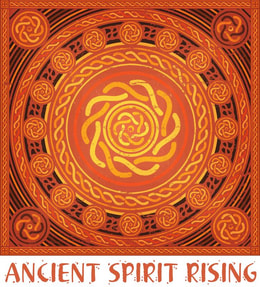A fascinating excerpt from "Between Worlds: Artful Auto/Biography and/as Pagan Healing" by Gina Snooks, Electronic Thesis, The University of Western Ontario, Part of the Feminist, Gender, and Sexuality Studies Commons, 2022
Toward a Decolonised Paganism
Theorizing matters of inclusion and exclusion in Paganism also necessitates a critical analysis of how Paganism is complicit in epistemic violence through the erasure and theft of Indigenous knowledges. In this matter there are two points that require attention: being in right relationship with the land and its more-than-human inhabitants, and the misuse of sacred objects and practices by folks who are not part of the living traditions in which these objects and practices are located. Paganism requires that Pagans be in right relationship with the lands upon which they live and practice their religion. Indeed, independent scholar Lisa A. McLoughlin argues that Pagans’ identity depends on it. However, these relationships are complicated when Pagans are uninvited guests on unceded Indigenous territories, as is often the case in North America. Meanwhile, for settlers, their cultural and ancestral knowledges are rooted in the mythologies of lands located elsewhere — lands from which their ancestors were displaced, sometimes forcefully and at other times due to various forms of oppression, and lands upon which they themselves may have never set foot. Settlers’ history with Turtle Island, then, is not the same as it is for its Indigenous peoples, but neither are their histories the same “as our ancestors with their ancestral lands” (McLoughlin 1). To further complicate the matter, Oneida Nation of the Thames Turtle Nation scholar Lina Sunseri reminds us that identity is a complex matter and that national identities “are fluid and socially constructed” and “never complete” (29). Sunseri makes this point to elucidate that the distinction between coloniser/ colonised and insider/outsider are not necessarily neatly organized dichotomies in the context of settler colonialism on Turtle Island.
Further related to the topic of decolonising Paganism, Pegi Eyers postulates that one of the reasons that settlers gravitate toward and appropriate Indigenous knowledges (IK), particularly Indigenous spirituality, is that they are disconnected from their own (European) Indigenous knowledges (EIK) and earth-connected cultures that center around concepts such as animism and ecomysticism. Hence she claims that settlers need to acknowledge their own loss of culture that has led to their collective and individual dysfunction and examine how this loss is at the root of their “spiritual hunger” and “yearning for holistic earth-connected community” (48). Her stance aligns with Eduardo Duran’s (Apache, Lakota, Tewa) claim that the process of colonisation “affects human beings at a deep soul level” (14) and that many non-Indigenous peoples (of Turtle Island) may want to decolonise from the “collective consumer colonization that has been imposed upon them” (14) and which is ongoing.
To this point, Anishnaabe Elder and Traditional teacher James Dumont advises that “Everyone needs to get back to their own IK” (qtd. in Eyers 17). Following this logic, Eyers argues that Paganism offers a meaningful way for settlers to live in alignment with earth-based spirituality through the reclamation of their own ancestors’ Indigenous knowledges and that returning to these knowledges is a necessary part of the process of decolonisation. Thus, Paganism can be a way of living more harmoniously with the lands, the gods, ancestors, and other more-than-human beings. In reference to Gaul Indigenous knowledges, Anne Ferlat, similarly, postulates that reclaiming European Indigenous spiritualities through decolonial paradigms might “offer a route for healing both the collective and personal traumas resulting from waves of acculturation” (2-3) brought about by long histories of aggressive acculturation, colonialism, cultural exchange, migration and forced relocation.
In alignment with these scholars and Elder Dumont, I contend that a decolonial approach to Paganism and a reclaiming of vernacular spiritualties rooted in one’s histories and cultures can provide a meaningful way to reconnect with earth-based holistic epistemologies, and that these practices can be part of the process by which human beings can begin to heal our collective soul wound. Nevertheless, this is not to imply that Pagan practices need not be examined and called out when they are themselves oppressive. Elucidating this point, Eyers also critiques Pagan practices that appropriate Indigenous knowledges by borrowing, blending, and creating new practices based on Indigenous sacred knowledges such as “aspects of vision quests, healing modalities and purification rituals from First Nations as diverse as the Lakota, Navajo and Cree. This artificial combining of cultural elements reinforces false ideologies and romanticizes stereotypes, and does nothing to strengthen actual First Nation communities and their recovery of nationhood, ancestral lands or cultural traditions” (157). While Eyers promotes Paganism rooted in European Indigenous Knowledges as an alternative to North American Pagans participating in practices that appropriate the Turtle Island Indigenous peoples, Scott Lauria Morgensen is more critical. In fact, he argues that “despite the perception that adopting European neo-paganism keeps white members of settler societies from appropriating Native culture, neo-paganism itself is reinvented by them to gain a relationship to Native land and culture that does not feel like the conquest that they know they inherit” (116).
Underpinning these critiques of Pagan appropriation of Indigenous knowledges, is the understanding that White privilege means that many White people feel entitled to access the sacred knowledges of cultures to which they do not belong, under the false assumption that all sacred knowledge is open. This is so, despite that not all Pagans identify as White, because Pagan culture is largely (White) Eurocentric and many of the founders of the contemporary Pagan movement were White people who pieced together sacred knowledges from various diverse cultures. Indeed, part of the process of decolonising contemporary Paganism is to untangle this information as to avoid repeating such forms of cultural theft. What is clear, then, is that unpacking Pagans’ relationship with land (any lands) is a complicated matter that must also address matters of Indigenous sovereignty and Indigenous land rights. Moreover, being in right relationship with land encompasses being in right relationship with people. Consequently, Pagans’ relationship with land cannot be disentangled from the broader landscape of settler colonialism, which is the structure by which Indigenous sovereignty has been eroded.
To the point of the misuse of sacred objects and ceremonies one of the most widely appropriated practices is that of smudging, which is a purification ceremony performed by smoking sacred herbs often referred to as medicines by Indigenous peoples. To be clear, many cultures worldwide use smoke to physically and energetically cleanse; hence, it is not the usage of smoke per se that is problematic. Rather the problem is when plants and medicines that are sacred to specific peoples are used out of context by people who have not been properly trained in that tradition mimic those rituals, or worse when these practices are commercialized. The usage of white sage is a prime example of this sort of misuse, which has led to an over harvesting of the plant. Another example is the performance of sweat lodge ceremonies (under that exact name), again by practitioners who are not trained, nor given permission, by elders or spiritual leaders in the Indigenous communities in which these practices originate. These practices are an act of cultural theft, but safety is also an issue when this ceremony is performed by untrained people, as is evident in fact that two people died at a retreat hosted by James Arthur Ray in Sedona Arizona (CBC 2011). As these brief examples demonstrate, Paganism can be complicit in the cultural appropriation of Indigenous knowledge and, in doing so, is complicit in the ongoing marginalization of Indigenous peoples.
Although, in this section, I have drawn attention to some of the issues within Paganism regarding racism, sexism, and cultural appropriation, it is also important to acknowledge that there has long been resistance to such practices by the Pagan community itself. Indeed, there is an ongoing movement toward making Paganism more inclusive and toward decolonising Paganism. On the topic of decolonising spirituality scholar Leela Fernandes writes “a decolonization of the divine necessitates a spiritual practice that includes a willingness to confront all forms of political and socioeconomic injustice…” (109), which requires a critical analysis of and willingness to address the myriad ways that spiritual traditions are decontextualized from the cultural political and historical landscapes in which they are located.
The problem, Fernandes argues, is that such an approach is based on “a form of spiritual appropriation that is void of social responsibility” (109). Although she is referring to the appropriation of Asian Indian spirituality, her argument is applicable in relation to Paganism as well. My point is that to decolonise Paganism, Pagans must be willing not only to name oppressive practices within the religion, but also to commit to repairing harms done to others in the name of Paganism.
On the topic of decolonising Irish polytheism, the Irish Pagan School offers a course called “Decolonising Your Druidry & Spiritual Practice: The roots of Druidic Religion & how to ensure your modern practice is authentic and respectful” in which Lora O’Brien unpacks the history of the modern Druid movement and advocates for spiritual practices that are rooted in the mythologies and living culture of Ireland.49 Notably, O’Brien does not propose that Indigenous Irish spirituality is for Irish natives and/or the Irish diasporic community only. Instead, O’Brien posits that anyone can practice pre-colonised Irish spirituality so long as the practice is not taken out of context of the living Irish culture and its histories. She does promote learning from Irish practitioners such as herself, as well as non-Irish practitioners who are immersed in the culture, histories, and folklore of Ireland (such as American writer Morgan Daimler). From this perspective, Indigenous Irish polytheism is not a closed religion, but respectful engagement is required.
O’Brien’s approach here aligns with Elder Dumont’s advice that everyone ought to reclaim their own Indigenous knowledges. Yet it should also be recognized that “The Gods were your Gods because they were the ones you honoured, the ones you prayed to and offered to, not because you passed some litmus test of color or ancestry. The culture was your culture because it was what you lived, valued, and passed on,” as Daimler succinctly puts it (2015, 69). In fact, in the context of Irish Paganism and reconstruction pre-colonised Irish Polytheism, Daimler is critical when cultural belonging and intention to preserve ancestral knowledges become a form of cultural “possession” (2015, 68), an act that excludes some folks from participation while permitting participation by others.
As these examples demonstrate, what constitutes closed religions versus open religions and cultural appropriation versus cultural appreciation is not a straightforward matter. By extension, who is permitted to participate in specific cultural traditions and who is excluded from participation, is a complicated matter that is deeply entwined with both the historical and contemporary context of unequal power relations and matters of resiliency and, therefore, must work toward autonomy and self-determination for marginalized groups.
GINA SNOOKS
Theorizing matters of inclusion and exclusion in Paganism also necessitates a critical analysis of how Paganism is complicit in epistemic violence through the erasure and theft of Indigenous knowledges. In this matter there are two points that require attention: being in right relationship with the land and its more-than-human inhabitants, and the misuse of sacred objects and practices by folks who are not part of the living traditions in which these objects and practices are located. Paganism requires that Pagans be in right relationship with the lands upon which they live and practice their religion. Indeed, independent scholar Lisa A. McLoughlin argues that Pagans’ identity depends on it. However, these relationships are complicated when Pagans are uninvited guests on unceded Indigenous territories, as is often the case in North America. Meanwhile, for settlers, their cultural and ancestral knowledges are rooted in the mythologies of lands located elsewhere — lands from which their ancestors were displaced, sometimes forcefully and at other times due to various forms of oppression, and lands upon which they themselves may have never set foot. Settlers’ history with Turtle Island, then, is not the same as it is for its Indigenous peoples, but neither are their histories the same “as our ancestors with their ancestral lands” (McLoughlin 1). To further complicate the matter, Oneida Nation of the Thames Turtle Nation scholar Lina Sunseri reminds us that identity is a complex matter and that national identities “are fluid and socially constructed” and “never complete” (29). Sunseri makes this point to elucidate that the distinction between coloniser/ colonised and insider/outsider are not necessarily neatly organized dichotomies in the context of settler colonialism on Turtle Island.
Further related to the topic of decolonising Paganism, Pegi Eyers postulates that one of the reasons that settlers gravitate toward and appropriate Indigenous knowledges (IK), particularly Indigenous spirituality, is that they are disconnected from their own (European) Indigenous knowledges (EIK) and earth-connected cultures that center around concepts such as animism and ecomysticism. Hence she claims that settlers need to acknowledge their own loss of culture that has led to their collective and individual dysfunction and examine how this loss is at the root of their “spiritual hunger” and “yearning for holistic earth-connected community” (48). Her stance aligns with Eduardo Duran’s (Apache, Lakota, Tewa) claim that the process of colonisation “affects human beings at a deep soul level” (14) and that many non-Indigenous peoples (of Turtle Island) may want to decolonise from the “collective consumer colonization that has been imposed upon them” (14) and which is ongoing.
To this point, Anishnaabe Elder and Traditional teacher James Dumont advises that “Everyone needs to get back to their own IK” (qtd. in Eyers 17). Following this logic, Eyers argues that Paganism offers a meaningful way for settlers to live in alignment with earth-based spirituality through the reclamation of their own ancestors’ Indigenous knowledges and that returning to these knowledges is a necessary part of the process of decolonisation. Thus, Paganism can be a way of living more harmoniously with the lands, the gods, ancestors, and other more-than-human beings. In reference to Gaul Indigenous knowledges, Anne Ferlat, similarly, postulates that reclaiming European Indigenous spiritualities through decolonial paradigms might “offer a route for healing both the collective and personal traumas resulting from waves of acculturation” (2-3) brought about by long histories of aggressive acculturation, colonialism, cultural exchange, migration and forced relocation.
In alignment with these scholars and Elder Dumont, I contend that a decolonial approach to Paganism and a reclaiming of vernacular spiritualties rooted in one’s histories and cultures can provide a meaningful way to reconnect with earth-based holistic epistemologies, and that these practices can be part of the process by which human beings can begin to heal our collective soul wound. Nevertheless, this is not to imply that Pagan practices need not be examined and called out when they are themselves oppressive. Elucidating this point, Eyers also critiques Pagan practices that appropriate Indigenous knowledges by borrowing, blending, and creating new practices based on Indigenous sacred knowledges such as “aspects of vision quests, healing modalities and purification rituals from First Nations as diverse as the Lakota, Navajo and Cree. This artificial combining of cultural elements reinforces false ideologies and romanticizes stereotypes, and does nothing to strengthen actual First Nation communities and their recovery of nationhood, ancestral lands or cultural traditions” (157). While Eyers promotes Paganism rooted in European Indigenous Knowledges as an alternative to North American Pagans participating in practices that appropriate the Turtle Island Indigenous peoples, Scott Lauria Morgensen is more critical. In fact, he argues that “despite the perception that adopting European neo-paganism keeps white members of settler societies from appropriating Native culture, neo-paganism itself is reinvented by them to gain a relationship to Native land and culture that does not feel like the conquest that they know they inherit” (116).
Underpinning these critiques of Pagan appropriation of Indigenous knowledges, is the understanding that White privilege means that many White people feel entitled to access the sacred knowledges of cultures to which they do not belong, under the false assumption that all sacred knowledge is open. This is so, despite that not all Pagans identify as White, because Pagan culture is largely (White) Eurocentric and many of the founders of the contemporary Pagan movement were White people who pieced together sacred knowledges from various diverse cultures. Indeed, part of the process of decolonising contemporary Paganism is to untangle this information as to avoid repeating such forms of cultural theft. What is clear, then, is that unpacking Pagans’ relationship with land (any lands) is a complicated matter that must also address matters of Indigenous sovereignty and Indigenous land rights. Moreover, being in right relationship with land encompasses being in right relationship with people. Consequently, Pagans’ relationship with land cannot be disentangled from the broader landscape of settler colonialism, which is the structure by which Indigenous sovereignty has been eroded.
To the point of the misuse of sacred objects and ceremonies one of the most widely appropriated practices is that of smudging, which is a purification ceremony performed by smoking sacred herbs often referred to as medicines by Indigenous peoples. To be clear, many cultures worldwide use smoke to physically and energetically cleanse; hence, it is not the usage of smoke per se that is problematic. Rather the problem is when plants and medicines that are sacred to specific peoples are used out of context by people who have not been properly trained in that tradition mimic those rituals, or worse when these practices are commercialized. The usage of white sage is a prime example of this sort of misuse, which has led to an over harvesting of the plant. Another example is the performance of sweat lodge ceremonies (under that exact name), again by practitioners who are not trained, nor given permission, by elders or spiritual leaders in the Indigenous communities in which these practices originate. These practices are an act of cultural theft, but safety is also an issue when this ceremony is performed by untrained people, as is evident in fact that two people died at a retreat hosted by James Arthur Ray in Sedona Arizona (CBC 2011). As these brief examples demonstrate, Paganism can be complicit in the cultural appropriation of Indigenous knowledge and, in doing so, is complicit in the ongoing marginalization of Indigenous peoples.
Although, in this section, I have drawn attention to some of the issues within Paganism regarding racism, sexism, and cultural appropriation, it is also important to acknowledge that there has long been resistance to such practices by the Pagan community itself. Indeed, there is an ongoing movement toward making Paganism more inclusive and toward decolonising Paganism. On the topic of decolonising spirituality scholar Leela Fernandes writes “a decolonization of the divine necessitates a spiritual practice that includes a willingness to confront all forms of political and socioeconomic injustice…” (109), which requires a critical analysis of and willingness to address the myriad ways that spiritual traditions are decontextualized from the cultural political and historical landscapes in which they are located.
The problem, Fernandes argues, is that such an approach is based on “a form of spiritual appropriation that is void of social responsibility” (109). Although she is referring to the appropriation of Asian Indian spirituality, her argument is applicable in relation to Paganism as well. My point is that to decolonise Paganism, Pagans must be willing not only to name oppressive practices within the religion, but also to commit to repairing harms done to others in the name of Paganism.
On the topic of decolonising Irish polytheism, the Irish Pagan School offers a course called “Decolonising Your Druidry & Spiritual Practice: The roots of Druidic Religion & how to ensure your modern practice is authentic and respectful” in which Lora O’Brien unpacks the history of the modern Druid movement and advocates for spiritual practices that are rooted in the mythologies and living culture of Ireland.49 Notably, O’Brien does not propose that Indigenous Irish spirituality is for Irish natives and/or the Irish diasporic community only. Instead, O’Brien posits that anyone can practice pre-colonised Irish spirituality so long as the practice is not taken out of context of the living Irish culture and its histories. She does promote learning from Irish practitioners such as herself, as well as non-Irish practitioners who are immersed in the culture, histories, and folklore of Ireland (such as American writer Morgan Daimler). From this perspective, Indigenous Irish polytheism is not a closed religion, but respectful engagement is required.
O’Brien’s approach here aligns with Elder Dumont’s advice that everyone ought to reclaim their own Indigenous knowledges. Yet it should also be recognized that “The Gods were your Gods because they were the ones you honoured, the ones you prayed to and offered to, not because you passed some litmus test of color or ancestry. The culture was your culture because it was what you lived, valued, and passed on,” as Daimler succinctly puts it (2015, 69). In fact, in the context of Irish Paganism and reconstruction pre-colonised Irish Polytheism, Daimler is critical when cultural belonging and intention to preserve ancestral knowledges become a form of cultural “possession” (2015, 68), an act that excludes some folks from participation while permitting participation by others.
As these examples demonstrate, what constitutes closed religions versus open religions and cultural appropriation versus cultural appreciation is not a straightforward matter. By extension, who is permitted to participate in specific cultural traditions and who is excluded from participation, is a complicated matter that is deeply entwined with both the historical and contemporary context of unequal power relations and matters of resiliency and, therefore, must work toward autonomy and self-determination for marginalized groups.
GINA SNOOKS
"Between Worlds: Artful Auto/Biography and/as Pagan Healing" by Gina Snooks, Electronic Thesis, The University of Western Ontario, Part of the Feminist, Gender, and Sexuality Studies Commons, 2022. Access the full paper >here<
WORKS CITED
McLoughlin, Lisa A. “US Pagans and Indigenous Americans: Land and Identity.” Religions, vol. 10, 152, 2019, pp.1-16.
Sunseri, Lina. Being Again of One Mind: Oneida Women and the Struggle for Decolonization. UBC Press, 2011
Eyers, Pegi. Ancient Spirit Rising: Reclaiming Your Roots & Restoring Earth Community. Stone Circle Press, 2016.
Duran, Eduardo. Healing the Wounded Soul: Counseling with American Indians and Other Native Peoples. New York and London: Teachers College Press, 2006
Ferlat, Anne. “Rediscovering Old Gaul: Within or Beyond the Nation State?” Religions vol. 10, no. 331, 2019, pp. 1-15.
Morgensen, Scott Lauria. Spaces Between Us: Queer Settler Colonialism and Indigenous Decolonization. University of Minnesota Press, 2011.
“Self-help guru convicted in sweat lodge deaths.” CBC, 23 June 2011,
Fernandes, Leela. Transforming Feminist Practice: Non-Violence, Social Justice and the Possibilities of a Spiritualized Feminism. San Francisco: Aunt Lute Books, 2003.
O’Brien, Lora. Lora O’Brien Irish Author & Guide, 2021,
https://loraobrien.ie/about-lora-obrien/. Accessed 20 April 2022.
Daimler, Morgan. Irish Paganism. Moon Books, 2015.
McLoughlin, Lisa A. “US Pagans and Indigenous Americans: Land and Identity.” Religions, vol. 10, 152, 2019, pp.1-16.
Sunseri, Lina. Being Again of One Mind: Oneida Women and the Struggle for Decolonization. UBC Press, 2011
Eyers, Pegi. Ancient Spirit Rising: Reclaiming Your Roots & Restoring Earth Community. Stone Circle Press, 2016.
Duran, Eduardo. Healing the Wounded Soul: Counseling with American Indians and Other Native Peoples. New York and London: Teachers College Press, 2006
Ferlat, Anne. “Rediscovering Old Gaul: Within or Beyond the Nation State?” Religions vol. 10, no. 331, 2019, pp. 1-15.
Morgensen, Scott Lauria. Spaces Between Us: Queer Settler Colonialism and Indigenous Decolonization. University of Minnesota Press, 2011.
“Self-help guru convicted in sweat lodge deaths.” CBC, 23 June 2011,
Fernandes, Leela. Transforming Feminist Practice: Non-Violence, Social Justice and the Possibilities of a Spiritualized Feminism. San Francisco: Aunt Lute Books, 2003.
O’Brien, Lora. Lora O’Brien Irish Author & Guide, 2021,
https://loraobrien.ie/about-lora-obrien/. Accessed 20 April 2022.
Daimler, Morgan. Irish Paganism. Moon Books, 2015.
| Pegi Eyers is the author of Ancient Spirit Rising: Reclaiming Your Roots & Restoring Earth Community, an award-winning book that explores strategies for social justice, uncolonization, ethnocultural identity, building land-emergent community & resilience in times of massive change. Available from Stone Circle Press or Amazon |



